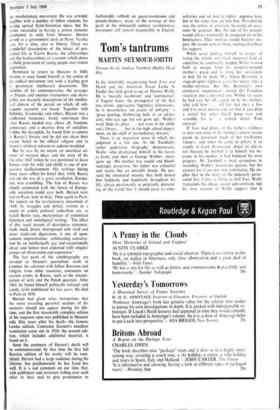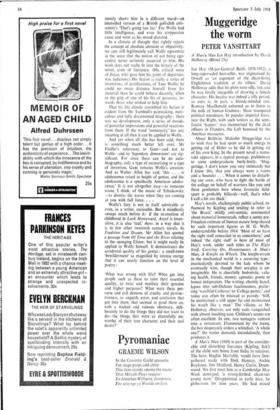Tom's tantrums
MARTIN SEYMOUR-SMITH
In his inimitably exasperating book Love and Death and the American Novel, Leslie A. Fiedler has little good to say of Thomas Wolfe. He is 'morally incoherent' and 'sentimental': if Eugene Gant. the protagonist of the first two novels, approaches 'legendary dimensions,' he is nevertheless 'an avatar of self-pity.' a `great panting, blubbering hulk of an adoles- cent, who can age but not grow up'; 'Wolfe's work finds its place . . not even in the child- ren's library . . . but in the high school depart- ment, on the shelf of masturbatory dreams.'
There is an important sense in which this judgment is a fair one. As Mr Turnbull's rather pedestrian biography demonstrates. Wolfe—who dramatised himself in his novels as Gant, and then as George Webber—never 'grew up.' His mother was stupid and blood- suckingly possessive, his father was colourful and warm, but an unstable drunk. He pur- sued the emotional security that both denied him helplessly and hopelessly throughout his life, always passionately or petulantly demand- ing of the world that it should cease its other activities and set him to rights: organise him, but at the same time set him free. Provided he was the centre of attention, he could on occa- sions be gracious. But the sins of his parents would always eventually be projected on to his benefactors. Their motives would become sus- pect. He would turn on them, rushing elsewhere for support.
While never putting himself in danger of losing the strictly uncritical, maternal kind of adulation he continually needed, Wolfe wanted both to escape from his propert. -111inded mother's grasp and to enjoy her ►icxriously in bed. So he made Mrs Aileen Bernstein, a stage-designer eighteen years his senior. into a mother-mistress. But Mrs Bernstein's own emotional requirement: turned this Freudian situation into a personal one. Within six years he had cast her otl, egged on by his mother, who told him '. . . tell her that she's a Jew and I've never known one yet that if you drop a nickel but what they'd jump over and scramble for it; a remark which 'Tom enjoyed.'
If Tom had plenty of his father's wildness in him and none of his mother's almost insane greed, he possessed much of her small-town vileness; and when he came to pillory it so cruelly in Look Homeward. Angel, he did so not because he loathed it in himself but be- cause, in his mother, it had hindered his own progress. Mr Turnbull is most scrupulous in recording Wolfe's monstrous egoism, but his excuses for it are not very convincing. He im- plies that in the story of the hideously perse- cuted Jew. / have a Thing to Tell You. Wolfe transcends his cheap. casual anti-semitism; but his own account of Wolfe suggests that it merely shows him in a different mood—an intensified version of a British golf-club anti- semite's 'That's going too far.' For Wolfe had little intelligence, and even his compassion came and went as his mood dictated.
In a climate of thought that rightly rejects the concept of absolute altruism or objectivity, we can still legitimately call Wolfe egocentric in the sense that the notion of not being ego- centric never, seriously occurred to him. His work does not really fit into the history of the novel, even of literature. (His critical sense of Joyce, who gave him his point of departure, was ludicrous.) His fiction is really a series of inventions, of justifications, of Tom Wolfe; he could no more distance himself from his material than he could behave decently, when in the grip of one of his fits of paranoia, to- wards those who wished to help him.
That his life closely resembled his fiction is evident from Mr Turnbull's painstaking, meti- culous and fully documented biography : there was no development, only a series of moods, of powerful impressions and powerful reactions from them. If the word 'immaturity' has any meaning at all then it can be applied to Wolfe.
And yet when all this has been said, there is something much better left over. Mr Fiedler's references to Gant—and not to Wolfe—and to 'legendary dimensions' are sig- nificant. For since there can be no auto- biography, only a type of memorising or a type of invention, Gant remains Wolfe's creation. And as Walter Allen has said, 'this . . . is adolescence raised to height of genius, and the adolescence is a specifically American adoles- cence.' It is not altogether easy—as someone wrote, I think, of the music of Tchaikovsky —to -dismiss the waves when they are coming at you with full force.. .
Wolfe's fury is not in itself admirable or even, in a writer, excusable. But it mindlessly sweeps much before it: if the re-creation of childhood in Look Homeward, Angel is insen- sitive, it is also 'real,' there, in a way that it is in few other twentieth century novels. In Tradition and Dream, Mr Allen has quoted a passage from Of Time and the River relating to the sponging Elinor; but it might easily be applied to Wolfe himself. It demonstrates the accidental quality of his genius : a small-town 'bewilderment' so magnified by intense energy that it can nearly function on the level of poetry: 'What was wrong with life? What got into people such as these to taint their essential quality, to twist and mutilate their genuine and higher purposes? What were these per- verse and evil demons of cruelty and destruc- tiveness, or anguish, error, and confusion that got into them, that seemed to goad them on, with a wicked and ruinous obstinacy, deli- berately to do the things they did not want to do—the things that were so shamefully un- worthy of their true character and their real desire?'











































 Previous page
Previous page